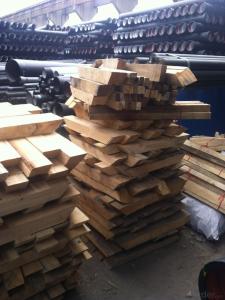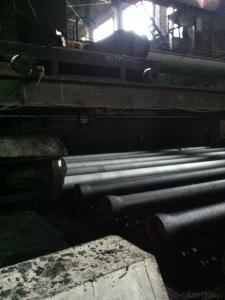DUCTILE IRON PIPEs K9 CLASS DN100
- Loading Port:
- Tianjin
- Payment Terms:
- TT OR LC
- Min Order Qty:
- 20 pc
- Supply Capability:
- 3000 pc/month
OKorder Service Pledge
OKorder Financial Service
You Might Also Like
Specifications
Subsidiary of Forbes Fortune 500 company (Ranking 485th in 2011). Provides full rang of ductile iron pipes with finest quality.
Company Profile
CNBM International Corporation belongs to China National Building Material Group Corporation (CNBM Group), ranking 365th in Forbes world Fortune 500 companies of 2012, and one of the largest state-owned companies in China since 1984. CNBM International was founded to provide sales support to international customers for the CNBM family of plants.
CNBM DIP Division is specialized in manufacturing high quality ductile iron potable / sewage water pipeline products in China. Ductile iron and cast iron pipe, fittings, valves, hydrants and drainage products are our main products, and orders are now shipped all over the world.
Our aim is to become an world-class influential supplier and professional service provider in world water industry.
- Q:Ductile iron pipe, socket connection, pipe length, you can cut open it?
- The cutting length is 4 meters from the jack. Among them, DN300 below 100% can be cut, DN350 above shear ratio is 10%, cut the small head to do chamfering treatment.
- Q:The difference between cast iron pipe and ductile iron pipe
- Cast iron pipes, also known as pig iron pipes, ordinary gray iron. Often used in socket connection, the sealing material is usually cement rigid interface.
- Q:How are ductile iron pipes different from other types of pipes?
- Ductile iron pipes, also known as DI pipes, are distinct from other types of pipes due to their unique properties and manufacturing process. Unlike other pipes such as PVC, steel, or concrete, ductile iron pipes are specifically designed to withstand high-pressure systems and offer exceptional strength and durability. One key difference lies in the material used. Ductile iron pipes are made from a type of cast iron that contains additional elements such as carbon and silicon, which give them their remarkable strength and flexibility. This composition allows DI pipes to handle high-pressure systems, making them suitable for applications that require reliable water supply, such as water mains, sewer systems, and industrial pipelines. Another distinguishing feature of ductile iron pipes is their ability to withstand external loads and pressure. DI pipes have a high tensile strength, which means they can bear heavy loads without cracking or breaking. This property makes them ideal for underground installations where they can endure the weight of soil, traffic, and other external factors. Furthermore, ductile iron pipes have excellent corrosion resistance. They are coated with a protective layer, usually through a process called cement lining, that guards against rust and corrosion caused by the elements, chemical reactions, or the transported fluids. This corrosion resistance significantly extends the lifespan of the pipes, reducing maintenance and replacement costs over time. Additionally, ductile iron pipes offer great flexibility. They are known for their ductility, meaning they can deform without fracturing under stress, making them less prone to cracks and leaks. This inherent flexibility allows them to withstand ground movement and seismic activities, ensuring a safe and reliable water distribution system. In terms of installation, ductile iron pipes are relatively easy to handle due to their lighter weight compared to other materials like concrete or steel. They are also available in various lengths and diameters, making them adaptable to different project requirements. Overall, ductile iron pipes stand out from other types of pipes due to their exceptional strength, resilience, corrosion resistance, and ease of installation. These properties make them a preferred choice for numerous infrastructure projects, where reliability and longevity are crucial factors.
- Q:Which direction should the spigot of the K9 ductile iron pipe be installed?
- Compared with the PE pipe, from the installation time, ductile pipe PE pipe installation is simple and rapid, and after the installation of internal and external pressure bearing better tightness and corrosion resistance; from the point of view, ductile pipe sealing better after installation, but also can improve the corrosion resistance of corrosion protection through a variety of means; from the hydraulic performance, because ductile pipe specifications generally refers to the inner diameter of PE pipe diameter specifications generally refers to the same specifications, because under the condition of ductile pipe can achieve greater runoff; from the installation and maintenance cost, ductile pipe have more favorable price. The main components of ductile iron pipes are carbon, silicon, manganese, sulfur, phosphorus and magnesium. The inner wall of zinc spray, anti-corrosion materials such as cement mortar.
- Q:How are ductile iron pipes different from cast iron pipes?
- Ductile iron pipes are different from cast iron pipes in terms of their composition and properties. Ductile iron pipes are made from a type of cast iron that has been treated with magnesium to improve its strength and flexibility. This makes ductile iron pipes more durable, impact-resistant, and less prone to cracking or breaking compared to traditional cast iron pipes. Additionally, ductile iron pipes have a higher tensile strength, allowing them to withstand higher internal and external pressures. In summary, ductile iron pipes are a more modern and advanced version of cast iron pipes, offering improved performance and longevity.
- Q:How does ductile iron pipe perform in areas with high soil consolidation?
- In areas characterized by significant soil consolidation, the performance of ductile iron pipe is outstanding. This is because ductile iron possesses inherent strength and flexibility, making it an ideal choice for underground installations where soil consolidation is prevalent. The ground in areas with high soil consolidation often undergoes substantial movement and settling, presenting challenges for buried infrastructure. However, ductile iron pipe's unique characteristics enable it to withstand these conditions effectively. To begin with, the high tensile strength of ductile iron allows it to resist external forces and pressures exerted by the surrounding soil. This strength ensures that the pipe maintains its structural integrity even in areas with high soil consolidation. Furthermore, ductile iron exhibits exceptional resistance to deformation, enabling it to handle ground movement without cracking or breaking. Its flexibility allows the pipe to absorb lateral forces associated with soil consolidation, preventing any damage. Additionally, ductile iron pipe is renowned for its durability and long service life. It is highly resistant to corrosion, abrasion, and chemical attacks, further enhancing its performance in areas with high soil consolidation. This resistance guarantees that the pipe remains intact and fully functional, even in challenging soil conditions. Moreover, the joints of ductile iron pipe are designed to provide secure and leak-free connections. This eliminates the risk of soil infiltration, which can exacerbate soil consolidation and lead to further ground movement. In conclusion, ductile iron pipe is exceptionally suited for areas with high soil consolidation due to its strength, flexibility, durability, and leak-free joints. Its ability to withstand ground movement and maintain structural integrity makes it a reliable choice for underground installations in such conditions.
- Q:Can ductile iron pipe be used for industrial applications?
- Yes, ductile iron pipe can be used for industrial applications. Ductile iron pipes are known for their durability, strength, and resistance to corrosion, making them suitable for various industrial settings. They can handle high-pressure and heavy-duty applications, making them ideal for industries such as water and wastewater, oil and gas, and chemical processing.
- Q:What is the relationship between the mechanical properties of spheroidal graphite cast iron and its spheroidization rate?
- Grade high good, mechanical performance can reach or exceed the standard, the grade is not high, the performance can not be achieved
- Q:Are ductile iron pipes prone to external corrosion?
- Yes, ductile iron pipes are prone to external corrosion.
- Q:What effect does magnesium play in nodular cast iron?
- Magnesium can be graphite precipitated in spherical form.But the specific mechanism is not clear, and now it is still debated in the academic circles.In addition, magnesium and sulfur generate MgS, which removes S from molten iron, which impedes the formation of spheroidal graphite.Therefore, Mg has two functions to eliminate the influence of S on Nodular Iron and promote the precipitation of graphite in spherical form.
1. Manufacturer Overview |
|
|---|---|
| Location | |
| Year Established | |
| Annual Output Value | |
| Main Markets | |
| Company Certifications | |
2. Manufacturer Certificates |
|
|---|---|
| a) Certification Name | |
| Range | |
| Reference | |
| Validity Period | |
3. Manufacturer Capability |
|
|---|---|
| a)Trade Capacity | |
| Nearest Port | |
| Export Percentage | |
| No.of Employees in Trade Department | |
| Language Spoken: | |
| b)Factory Information | |
| Factory Size: | |
| No. of Production Lines | |
| Contract Manufacturing | |
| Product Price Range | |
Send your message to us
DUCTILE IRON PIPEs K9 CLASS DN100
- Loading Port:
- Tianjin
- Payment Terms:
- TT OR LC
- Min Order Qty:
- 20 pc
- Supply Capability:
- 3000 pc/month
OKorder Service Pledge
OKorder Financial Service
Similar products
New products
Hot products
Related keywords



























